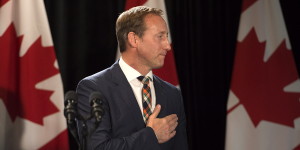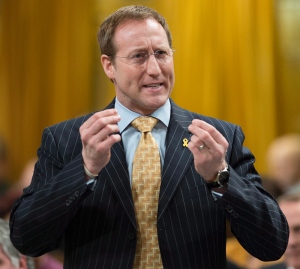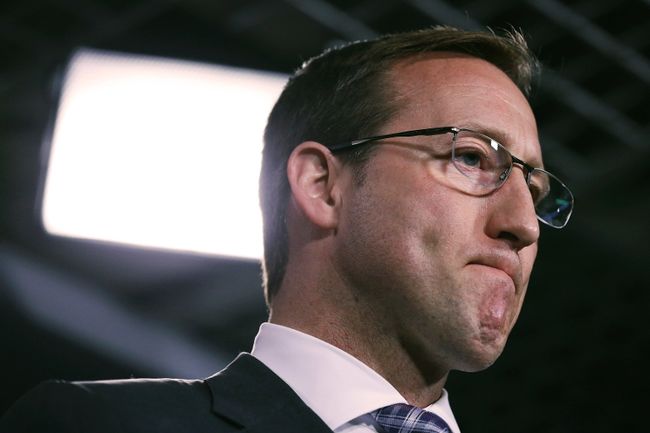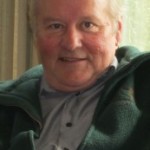 By Ray Rivers
By Ray Rivers
June 5, 2015
BURLINGTON, ON
Andrew Coyne sums up Peter MacKay pretty well – “a politician of many titles but little achievement.” Considering his personal use of a military helicopter, his ongoing war against the Supreme Court and Canada’s constitution, his is an unenviable record.

Federal Justice Minister Peter MacKay announces his resignation in Stellarton, N.S on Friday, May 29, 2015. MacKay, the MP from the riding of Central Nova, was first elected in 1997.
And now MacKay joins a pack of up to 30 Conservative MPs who are planning to jettison the good ship Tory, just to cash in on their early retirement bonus before the plan expires. MacKay’s desertion is particularly significant for Mr. Harper since his seat, Central Nova, is considered the last safe harbour for the Tories in Atlantic Canada. His father, Elmer, had once held this riding, giving it up to newly nominated PC leader Brian Mulroney in 1983 in exchange for a plumb patronage job with the Atlantic Development Agency.
Peter MacKay will be best remembered as the man who buried the federal Progressive Conservative Party, selling out to the more extreme right-wing Alliance/Reform/CRAP. In doing so, he broke his promise to ‘red Tories’, like Joe Clark and Scott Brison, who would sooner leave than come on board a vessel they no longer could recognize.
But MacKay, who is closer politically to Stephen Harper than to what his old party actually stood for, was given plum postings by Harper as payment for his treachery.
Today, Harper’s Tories are falling like a lead anchor on the east coast. The Liberals seem poised to clean up come the next election. And interestingly, the NDP are the second choice. But that might change as we see the NDP topping-out the Liberals nationally, according to the latest EKOS poll.
Boosted by the NDP’s sweep in last month’s Alberta election, Mr. Mulcair is trending to outpace Mr. Trudeau’s party. Were that trend to continue, strategic voting – whereby voters hold their noses and vote Liberal to block the Tory candidate – may be in for some re-definition.
Liberalism in Canada, and the US (Democrats), has its roots in the once powerful Whig political movement in Great Britain, going back centuries. It was the Liberals who abolished slavery and created the modern welfare state. Liberal socio-economic policies, developed by great thinkers like Adam Smith, JM Keynes and John Stuart Mills helped shape our modern economies – at least until the neo-conservatives, like Lady Thatcher and Ronald Reagan, stuck their fingers in.
Liberals hold, somewhat immodestly, that they are the party of ideas. But they are also the party of nuance and complexity, making them more challenging to appreciate. For many people Liberals represent the middle ground in political theatre, though some say standing for so many things means they stand for nothing. And unlike the Tories who draw their support from the wealthy, and the NDP which represents labour, Liberals generally lack a loyal socio-economic constituency to call their own.

McKay often struggled to make his point.
Perhaps for this reason, by the early 1920’s, the British Liberal party had been delegated third party status. Maybe this was a result of the Conservative and Labour party constituencies just following the voting prerogatives of their parties. Or, it might have been an inevitable result of the ‘first past the post’ (FPP) system of electing parliamentarians, a system which works well in a two party system but fails to represent the public in a more diverse multi-party political climate.
Stephan Harper and Jean Chretien each were elected to majority governments with the support of little more than a third of the voting public. In the case of Harper, who has re-united the right, it means that the two-thirds of Canadians, who favour more centrist policies, have and would again vote against him – but he might still win a majority through vote splitting among the other parties.
One option for our political system to better reflect voters wishes might be for the Liberals and NDP to unite as a centre-left coalition, and bring Canada back to a workable two party system. However, that is an unlikely to happen for a number of reasons, including the influence of trade unions in the NDP and the NDP Quebec sovereignty policy. Thus, those wanting to see the end of Mr. Harper will need to vote strategically or accept the consequences.
Alternatively, we could change our electoral system. One option would be to adopt some configuration of the thing called proportional representation, a rather complicated combination of traditional FPP with parliamentary seats also awarded for the popular vote. Most European governments have adopted this approach. B.C. and Ontario held referenda to implement provincial proportional systems a few years back, but the vote failed to pass in each case.
The Green Party has been a big supporter of proportional representation, and there had been much discussion of proportional representation at the last NDP nomination conference, including a potential deal for cooperative voting with the Liberals to pave the way for its adoption.
Another, and less radical approach, would be to offer a preferential, or ranked ballot, for voters in the next election. The voters would rank their choices and the winning candidate would be the first or second choice of at least 51% of the voters. This approach received approval at a Liberal biennial policy conference a few years back. It is also a plan the Ontario government will soon be offering municipalities.

Just going to have to get by on $1 million
But Peter MacKaty won’t have to worry about any of this. More than likely his old riding will go to the Liberals in the upcoming election. His early retirement package is worth more than a million dollars so nobody can blame him for running to the bank rather than running in the election. And given his performance as a parliamentarian, nobody will notice his absence.
 Ray Rivers writes weekly on both federal and provincial politics, applying his more than 25 years as a federal bureaucrat to his thinking. Rivers was a candidate for provincial office in Burlington where he ran as a Liberal against Cam Jackson in 1995, the year Mike Harris and the Common Sense Revolution swept the province.
Ray Rivers writes weekly on both federal and provincial politics, applying his more than 25 years as a federal bureaucrat to his thinking. Rivers was a candidate for provincial office in Burlington where he ran as a Liberal against Cam Jackson in 1995, the year Mike Harris and the Common Sense Revolution swept the province.
Background links:
MacKay Coyne’s Take MacKay’s Leaving
Peter MacKay Bio MacKay Election MacKay Warmth
MacKay Exit Mulcair or Trudeau British Whigs The Liberal Party















Ray,
Let’s play fair in the sand-box. How many Liberal and NDP MPs are walking away from the next election to get their freedom 55 pension??
As for proportional representation, we had a choice some years ago to consider this and the majority decided against it.
PS: how about the Wynne’s Ontario Liberal Majority increasing the provincial gov’t seats by 15 MPP seats. The Tory’s decreased it from 130 and now Wynne wishes to increase it again. My My, how do the Liberals like to spend our taxes without accountability (Hydro One sale logistics to be get ‘in camera’). Nothing like more gov’t politicians and bureaucrats all receiving golden handshakes, benefits, pensions and perks that us mere mortals will never ever get to see or enjoy………….just pay for.
C’mon, Ray, you know that he is “entitled to his entitlements” as David Dingwall(L) informed us. I think the only thing MacKay will be remembered for is uniting the Conservative party vote. He did what had to be done to achieve electoral balance in the country, and as they say, you have to break the eggs to make the omelette. Elizabeth May benefiting from a changed voting system — now that really is something to wish for. I am just quivering with excitement at that possibility.
Just read your article and apart from the unfortunate mean spirited comments about MacKay, which did detract somewhat from the level of content, I found it a good read. Your ideological bias is quite apparent and to be expected, but it does prevent your comments from rising to a higher level of meaningful analysis which would be of benefit to your readers.
I appreciate that you openly state your Liberal experience and leanings at the end of your articles, a refreshing move.
Susan thanks for that website – really interesting if we can believe it would hold up that way. And Ken – that is so charming.
Thanks for commenting…
Ray
Their is a “down east” expression that my Grandmother was sometimes heard to say when she was tired of someone and they outstayed their visit. It is appropriate here too….
Peter – here is your Hat, what is your hurry.
Re Strategic Voting:
If you’re interested in electoral forecasts and political polling in Canada, see https://www.threehundredeight.com/